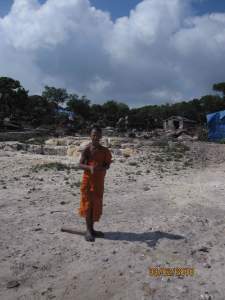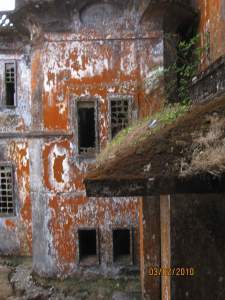Poachers and Gamekeepers
“You want beer party now?”
As we wandered the haunted hotel by torchlight, Saa’s invitation kind of broke the mood.
The Bokor Hill Station, a French colonial ghost town in Bokor National Park, Cambodia, is film-set spooky. Western explorers discovered the area in 1917, then a road and a beautiful art deco hill station followed during the 20s.
At the Bokor Grand Hotel and Casino, gamblers lost fortunes then threw themselves from the verandah into the ravine below.
As it happens, having hiked ten miles uphill with the prospect of more of the same tomorrow, I didn’t fancy a beer party. Z son did. But only if he was allowed to drink beer.
We are standing where they stood, by the concrete skeleton of a dais where a band would have played while ladies sipped tisanes, looking out across the forest and the plain to the lights of Phu Quoc island in the distance.It is cold enough to need a coat, and the ambience on the darkened staircase and in the rubble-filled basement is a little Blair Witch Project for comfort. There is something particularly sinister about the white-tiled bathrooms, reminiscent of a torture chamber.
The town was abandoned twice. First during the Vietnamese/IndoChina liberation struggle during World War II, then a second time in 1972, after a battle between the Khmer Rouge and the incumbents.
Until five years ago you could watch animals wandering across the deserted gardens and through the abandoned houses: wild boar, monkeys, and even the occasional tiger. Now all edible lifeforms — a quite extensive category in Cambodia — have moved firmly into the interior.
“We go Sokor hotel now,” says Saa.
The nascent Sokor hotel is a source of derision to Kampot’s many expats, and fierce pride to the locals, to whom it promises tourist dollars in quantity.
A billion-dollar construction project, on the highest point of the national park, it takes obvious inspiration from the Bellagio in Vegas, with ten storeys packed on top of an expansive promenade, fronted by a fountain-filled lake.
The road to the park has been closed for three years to allow for construction, which is proceeding at a pace somewhere between leisurely and glacial.
We had passed through the site earlier that day. Twenty-odd workmen had been visible, perhaps seven of them working, pick-axing foundations from sandstone by hand, one man to a hole, in a manner one could only describe as desultory.
Long grass grew up through optimistic piles of bricks, while the spiffy full-colour billboard with the plans seemed not only Ozymandian but wildly out of context.
To an uncharitable mind, the building project, road closure, and illegal logging activities in the park might well seem linked.
Which is before one gets to the environmental impact of a project that scale, although pick-axes are certainly low carbon.
Anywise, off we trot, and I am glad we do not to have to negotiate the unguarded 50-foot pits in the dark.
We stop at a dazzling art deco building, with coloured marble and soft pink balustrades, acres of brand new glass looking onto naturally shaded halls, and elegant tiled porticos.
“Sokor Palace Hotel,” says Saa, definitively. It is as ghostly in its emptiness as the ruins of the church.
Opposite, outside a rapidly refurbed building, a gang of Cambodian guys are eating, cross-legged on mats on a concrete table.
“Sit, sit,” says one. We sit. They offer us dishes of pork with lemongrass and chilli, and a spicy, delicious curry of a gelatinous, gamey meat I cannot immediately identify.
“You like Cambodian wine?” asks our host.
I do like Cambodian wine, I say, thinking of the dark, spicy honey wine I had drunk with Soi and his stoner mates in Koh Kong. They pass us plastic cups of a golden liquid, mine enriched with unidentified floating objects of sufficient size to be clearly a part of the experience.
I taste it. It is about thirty proof.
“Honey wine?” I ask.
“Rice wine, rice wine,” they say.
The toasts begin. It dawns on me that we are having a beer party whether we like it or not.
I sample the floating objects. They are some sort of wood, or seed, with the texture of hairy, sodden cork and an oaky, vanilla-ed cassia-cinnamon taste.
Our hosts are topographers and electrical engineers, mainly from Phnom Penh, who have been working on the new hotel for over a year. They are winding down towards Chinese New Year, and kicking back with a friend from out of town.
“Cambodian people are very friendly,” observes our host. I agree sincerely and allow Z a sip of my rice wine.
Predictably, it goes straight to his head. He begins to gurn and grab for more, causing great hilarity, then embarks on a convoluted story of his feats of heroism on the ascent to the station.
Our hosts offer him more. I discourage them.
Joern and I decide to go with the flow. “In Indonesia I trekked on bad alcohol and no sleep,” he says, philosophically. “My system is used to this shit.”
There are more rounds of toasts, during which Z achieves another mouthful of rice wine, then the party moves indoors. The women and the children are safely in bed, and the serious drinking begins.
A large bottle of something ominously clear goes into a bowl with ice and lime juice. Ti ceremoniously pours this into beer glasses, tops with Sprite, and slams down hard, pouring the resulting fizz into plastic glasses which travel the circle at some speed.
This is less of a party than a drinking contest, I realise.
Suddenly, everything is very funny. Joern endeavours to establish exactly what they are celebrating.
Apparently, it is not just the arrival of a friend. Hai, another electrical engineer, giggles naughtily. “Don’t tell him,” he says, nodding at Saa, our oblivious ranger. “Today we catch wild pig. Very delicious.”
Hai downs his slammer. “Now very, very hard to find,” he adds, without irony.
I recall the optimistic literature produced by a Western wildlife charity in the ranger lodge. Their development plan includes working with local villagers to provide alternatives to subsistence hunting, hiring reformed poachers to work with the rangers to outreach into the community, producing alternative opportunities to generate income, setting up camera traps to observe such rare fauna as, erm, wild pig, and it dawns on me that whoever wrote the Powerpoint does not have a sodding clue. These guys are graduates, professionals, hired to build a resort hotel in a protected national park, and a wild boar is, basically, dinner.
Seven or eight years ago you could watch wild boar shuffling through the remnants of the town, and occasionally a tiger slinking in the shadows of the grand hotel. But wildlife populations have been dropping like a stone for the last three years, essentially because the builders have been eating them. All the guides know this. All the expats know this. Why on earth doesn’t the charity?
Another bottle of moonshine appears from nowhere and goes straight into the pot. I am developing an anticipatory headache but console myself that at least the chaps have full use of their eyes.
Joern flinches slightly. “You realise they have a jerry-can of the stuff back there?” he says.
The guy in the pimp jacket, a suede blouson with faux leopard collar, swaps first coat, then rings with Z. He is sufficiently drunk to want to swap his (apparently) gold pinkie ring for Z’s stainless steel skull and crossbones pirate ring. Z turns him down, a decision he will later regret.
I ask Hai if he can talk to Saa about whether we can see some birds tomorrow. “There are no animals here,” Hai says definitively, as our cook produces a bowl of wild boar laced with visibly terrifying quantities of chilli. “No paths. You will not see a thing.”
Pimp jacket comments disparagingly on Z’s lack of musculature. An arm wrestling match ensues. He attempts to force a cigarette on Z, who reacts with utter horror, but slips a slammer down him while my eyes are elsewhere.
Before we set out, we had discussed the dangers of hospitality, as in avoiding drinking contaminated water when communal bowls are passed round.
I had not, however, anticipated the dangers of hospitality when it comes to booze.
The serious-minded telecoms guy is first out, his head slumping forwards onto his crossed ankles in a flawless yoga pose. He is unwakeable, no matter how hard Z tries.
Someone arrives with beer. This goes into the bowl. The slammers continue, as do the hilarious toasts.
I ask Hai whether the building opposite is the Sokor Palace Hotel. “No, no,” he says. “It old city hall. The guy who build hotel, he takes it for his own house.”
I ask him when the hotel will be finished. “I don’t know,” he says. “The plans have changed.”
Five years? I ask. Ten years? Hai shrugs.
(The next day we will meet a harassed-looking project manager from Vietnam, who is charged with delivering the project in time for 2011. Z will say, “You can’t build a ten-storey building in a year with twenty men and no machinery.” He will reply, “The schedule says 2011,” then look alarmed.)
Pimp jacket is endeavouring to palm his drinks off on anyone who will have them. He is spotted, and drinks double. Soon his head, too, is hanging between his knees, and it takes two people to carry him to bed.
Mercifully soon after this, as heads begin to bow in a tribute to our European beer-drinking genes, it is time for us to leave. The chaps will be up and working at 5am. We will be up at seven in search of wildlife which will, as Hai predicted, prove elusive.


